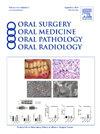与纳武单抗免疫治疗相关的粘膜类天疱疮:一例罕见病例的报告和文献回顾
IF 1.9
3区 医学
Q2 DENTISTRY, ORAL SURGERY & MEDICINE
Oral Surgery Oral Medicine Oral Pathology Oral Radiology
Pub Date : 2025-07-21
DOI:10.1016/j.oooo.2025.04.079
引用次数: 0
摘要
免疫检查点抑制剂(ICIs)已经成功地用于治疗各种恶性肿瘤患者;然而,这些药物也被指责为涉及多个解剖部位的广泛不良事件,包括口腔粘膜。在此,我们描述了一个罕见的与PD-1抑制剂纳武单抗相关的粘膜类天疱疮(MMP)病例,并回顾了免疫治疗相关MMP的英文文献。病例描述一名74岁女性,因口腔黏膜、下唇和舌头广泛疼痛的溃疡而就诊。9个月前,患者被诊断为肺腺癌,接受了4个周期的化疗和放疗;她同时接受了纳武单抗,也继续作为单药治疗。口腔病变发生在最后一次纳武单抗注射后,大约在诊断和免疫治疗开始后8个月。临床临时诊断为自身免疫性或免疫治疗相关起源的囊泡性疾病,进行病灶周围诊断性口腔活检。显微镜下观察到上皮下分裂,而直接免疫荧光显示免疫反应物在基底膜区呈线性沉积。ELISA检测患者血清中无循环自身抗体,最终诊断为MMP。考虑到症状发作与纳武单抗使用之间的时间关系,免疫治疗与MMP之间的病因学相关性被认为是非常可能的。全身强的松龙治疗,以及与患者肿瘤科医生会诊后停用纳武单抗,导致口腔病变迅速缓解。结论:尽管ICIs在几种癌症的治疗中具有明确的作用,但它们也与不同严重程度的副作用有关。特别是,与ici相关的MMP似乎相当罕见,在英语文献中只有少数病例报道。口腔卫生保健专业人员应该意识到这些不良事件,因为他们的及时识别,准确的诊断和适当的管理可以提高患者的生活质量。本文章由计算机程序翻译,如有差异,请以英文原文为准。
Mucous membrane pemphigoid related to nivolumab immunotherapy: report of a rare case and review of the literature
Background
Immune-checkpoint inhibitors (ICIs) have been successfully used in the management of patients suffering from various malignancies; however, these agents have been also blamed for a wide spectrum of adverse events involving several anatomic sites, including the oral mucosa. Herein, we describe a rare case of mucous membrane pemphigoid (MMP) related to PD-1 inhibitor nivolumab and review the English-language literature on immunotherapy-associated MMP.
Case Description
A 74-year-old female presented for the evaluation of widespread painful ulcerations affecting the buccal mucosae, lower lip, and tongue. Nine months ago, the patient was diagnosed with lung adenocarcinoma and underwent 4 cycles of chemotherapy followed by radiation therapy; she was concurrently receiving nivolumab, which was also continued as monotherapy. The oral lesions developed after the last nivolumab injection, approximately 8 months after diagnosis and initiation of immunotherapy. With a clinical provisional diagnosis of a vesiculobullous disease of autoimmune or immunotherapy-associated origin, a perilesional diagnostic oral biopsy was performed. Microscopically, subepithelial clefting was observed, while direct immunofluorescence showed linear deposition of immunoreactants at the basement membrane zone. No circulating autoantibodies in patient’s serum were detected by ELISA and a final diagnosis of MMP was rendered. Considering the temporal relationship between the onset of the symptoms and nivolumab administration, an etiologic correlation between immunotherapy and MMP was considered very likely. Systemic prednisolone treatment, along with nivolumab withdrawal following consultation with patient’s oncologist, resulted in rapid remission of oral lesions.
Conclusions
Although ICIs have an established role in treatment of several cancers, they have also been associated with side effects of variable severity. Especially, ICI-related MMP seems to be quite rare with only a few cases reported in the English-language literature. Oral health care professionals should be aware of such adverse events, as their prompt recognition, accurate diagnosis, and appropriate management improves patients’ quality of life.
求助全文
通过发布文献求助,成功后即可免费获取论文全文。
去求助
来源期刊

Oral Surgery Oral Medicine Oral Pathology Oral Radiology
DENTISTRY, ORAL SURGERY & MEDICINE-
CiteScore
3.80
自引率
6.90%
发文量
1217
审稿时长
2-4 weeks
期刊介绍:
Oral Surgery, Oral Medicine, Oral Pathology and Oral Radiology is required reading for anyone in the fields of oral surgery, oral medicine, oral pathology, oral radiology or advanced general practice dentistry. It is the only major dental journal that provides a practical and complete overview of the medical and surgical techniques of dental practice in four areas. Topics covered include such current issues as dental implants, treatment of HIV-infected patients, and evaluation and treatment of TMJ disorders. The official publication for nine societies, the Journal is recommended for initial purchase in the Brandon Hill study, Selected List of Books and Journals for the Small Medical Library.
 求助内容:
求助内容: 应助结果提醒方式:
应助结果提醒方式:


